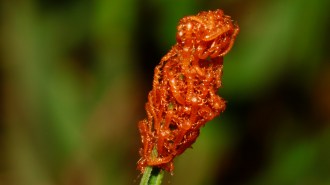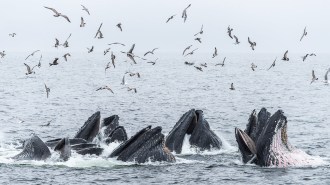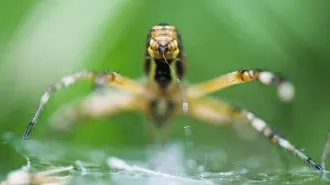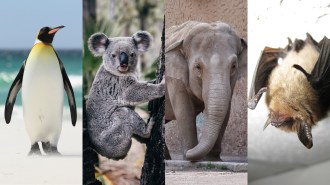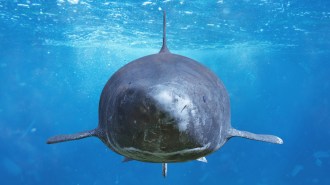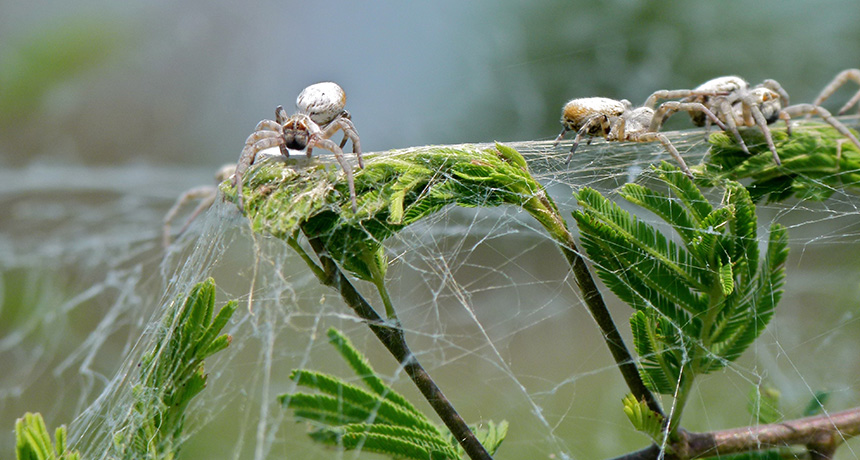
ONE BOLD IDIOT In colonies of velvet spiders (shown), one bold spider with misinformation can be a disaster.
BernardDUPONT/flickr/(CC BY-SA 2.0)
ANCHORAGE, Alaska — The wrong-headed notions of an influential individual can make a group sluggish in learning from its mistakes, even among spiders.
Velvet spiders (Stegodyphus dumicola) with bold behavior but incorrect information were bad influences on their colonies, researchers reported June 11 at the annual conference of the Animal Behavior Society. Spider growth faltered in these colonies because the naïve group mates were slow to catch on to bold ones’ errors. In contrast, misinformed shier spiders didn’t undermine their colonies’ prospects.
The bold idiots could be considered “keystone individuals,” says study coauthor Jonathan Pruitt, a behavioral ecologist at the University of Pittsburgh. Other research has documented the existence of such disproportionately influential individuals for good or ill in a variety of species. Older female elephants lead their herds; superspreader humans transmit diseases to an unusually large number of people. Yet, Pruitt says, he knows of no previous experiment comparing social groups seeded with individuals deliberately taught either right or wrong information.
Pruitt and collaborator Noa Pinter-Wollman of the University of California, San Diego developed an experiment mimicking natural spider splinter groups that venture away from their original colony to start a new one. That allowed them to study the interplay of personality and information.
Pruitt and colleagues tested spiders for boldness by puffing air at them, a disturbance that prompts them to feign death. Spiders that quickly resurrected were ranked as the bolder ones. Researchers then trained some of the bold spiders, as well as some unexceptional ones, to associate a particular pattern of web quivering (created by a vibrator) with a tidbit of desirable moth meat. A different vibrator setting indicated a deadly ant was nearby.
The researchers set up colonies by combining one bold spider and nine not particularly bold ones. One spider in each colony, either a bold one or a generic one, had been trained on the vibrations. But to create misinformation for some of the new colonies, researchers switched vibration cues so the trained spider huddling in the group’s nest refuge did exactly the wrong thing. Picking up vibes that used to mean food, the educated individual would leave the refuge to climb the web only to find a deadly ant. And when the web jiggled as it had when researchers had presented ants, the experienced spider did not rush out. Often it emerged so slowly from the refuge that prey in a natural setting would have had time to struggle free of the web.
At first, the bold spiders, correctly informed or not, did most of the responding to vibration cues. But their nest mates eventually joined in. A knowledgeable bold spider did not offer a huge advantage over a knowledgeable shy one. But the colonies stuck with a bold, wrong spider struggled. They took an extra experimental trial or two to learn to hesitate before dashing out at what had been the old cue for lunchtime. And after 12 repeated trials, they were still mostly missing the opportunities to feed. In this self-induced famine, spiders lost weight.
The project inspires more questions. Daniel Rubenstein of Princeton University, who studies decision making in animals, wants to know whether bolder individuals in the real world would be more likely to be misinformed than anyone else. He’s also curious about how the stage of a group’s development affects the kinds of personalities, or behavioral types, that benefit or harm it. Visionary founders don’t always prosper as managers, he notes.
What Pruitt muses about are the many ways that some bold colony member in the species’ native southwestern African deserts could get unexceptional spiders killed. “How do all the generic individuals become so susceptible?” he asks.



